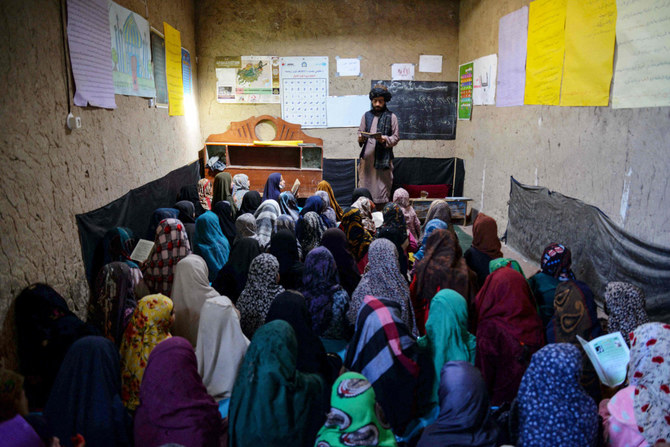
If the debacle of last week’s conference in Doha to discuss the future of Afghanistan is any guide, 2024 will probably be another bleak year for the Afghan people.
Special envoys on Afghanistan from more than 25 countries and organizations met in the Qatari capital at the behest of UN Secretary-General António Guterres. The meeting had two main objectives.
The first was to create a framework for future international engagement with Taliban-controlled Afghanistan. The second was to find consensus on who should be the UN special envoy for Afghanistan, with a mission to “focus on diplomacy between Afghanistan and international stakeholders and advancing intra-Afghan dialogue.” This is important stuff. Regrettably, neither of these objectives was met. Once again, it will be the Afghan people who suffer.
That the conference failed to meet even the lowest expectations should have come as no surprise. It was doomed from the outset. At the last minute, the Taliban boycotted it altogether.
The Taliban’s reason for skipping the meeting was petty. The UN had also invited a small selection of representatives from Afghan civil society, but Taliban did not like this and refused to participate. It is unclear how the UN decided on which civil society representatives and organizations to invite. However, it is interesting to look at the groups they did not invite.
For example, nobody from the National Resistance Front, arguably the most credible anti-Taliban opposition, was invited. Also, no organization or individual that has been participating in the Vienna Process was asked to join the gathering. The Vienna Process is a series of meetings in the Austrian capital in recent years between different parts of Afghan civil society. All participants in the Vienna Process are united on a platform opposed to Taliban rule. The group last met in December, when 50 Afghans representing different ethnic groups attended. At a minimum, it would have made sense for the UN to invite either the National Resistance Front or Vienna Process participants to Doha.
The failure of the Doha conference followed another damning report by the UN on the growing terrorist threat in Afghanistan. The report, by the UN Analytical Support and Sanctions Monitoring Team, lays out in detail the growing transnational terrorist threats that have evolved in Afghanistan since the Taliban took over. Despite Taliban assurances to the Trump administration that they would not harbor terrorist groups such as Al-Qaeda if the US withdrew its forces, the opposite is true.
That the conference failed to meet even the lowest expectations should have come as no surprise.
Luke Coffey
The UN report says: “The relationship between the Taliban and Al-Qaida remains close, and the latter maintains a holding pattern in Afghanistan under Taliban patronage.” Do not believe that Al-Qaeda operatives are returning to Afghanistan to live out a quiet life. On the contrary, the UN report says the militant group “continues to pose a threat in the region, and potentially beyond.”
It is undeniable that different transnational terrorist organizations, including Al-Qaeda, are active in Afghanistan in a way not seen in years. With the international community focused on Ukraine and Gaza, policymakers had better wake up to the fact that Afghanistan is once again becoming a hotbed of terrorism.
With each month that goes by since they took power, the Taliban are realizing that it is far easier fighting an insurgency against the government that to be the government responsible for the well-being of the whole country. The incompetence of the de facto Taliban government is evident. Afghans face an acute humanitarian crisis, food shortages, and economic problems. There has also been a series of unfortunate natural disasters, such as earthquakes and floods, that have compounded the humanitarian crisis. Exacerbating the dire situation is the international community’s inability to find a way to support the Afghan people with aid without indirectly lining the pockets of the Taliban leadership. It was this issue that the UN hoped to address in Doha.
For the well-being of the Afghan people, the Taliban should have attended the Doha conference. They need to start working with the international community in a constructive way. At a minimum, the Taliban should live up to their original promises of forming an inclusive government, safeguarding basic human rights especially for women, and the rejection of transnational terrorist groups such as Al-Qaeda. Sadly, this is unlikely to happen anytime soon.
Meanwhile, the UN is naive if it thinks any discussion about the future of Afghanistan can proceed without including the National Resistance Front or other groups who are participating in the Vienna Process. In fact, when the Vienna Process meets again later this year, the UN secretary-general should send a representative or at least an observer. If there is no problem meeting the Taliban, then meeting other sections of Afghan civil society, especially those most persecuted and marginalized, should not be a problem for the UN.
So far, the Taliban leadership has showed no genuine desire to work with the international community in a way that can help alleviate the suffering of the Afghan people, while also addressing the legitimate terrorist concerns many have. In retrospect, it’s unclear what the Doha conference was meant to achieve under these circumstances. Frankly, the meeting should have been postponed.
• Luke Coffey is a senior fellow at the Hudson Institute. X: @LukeDCoffey








